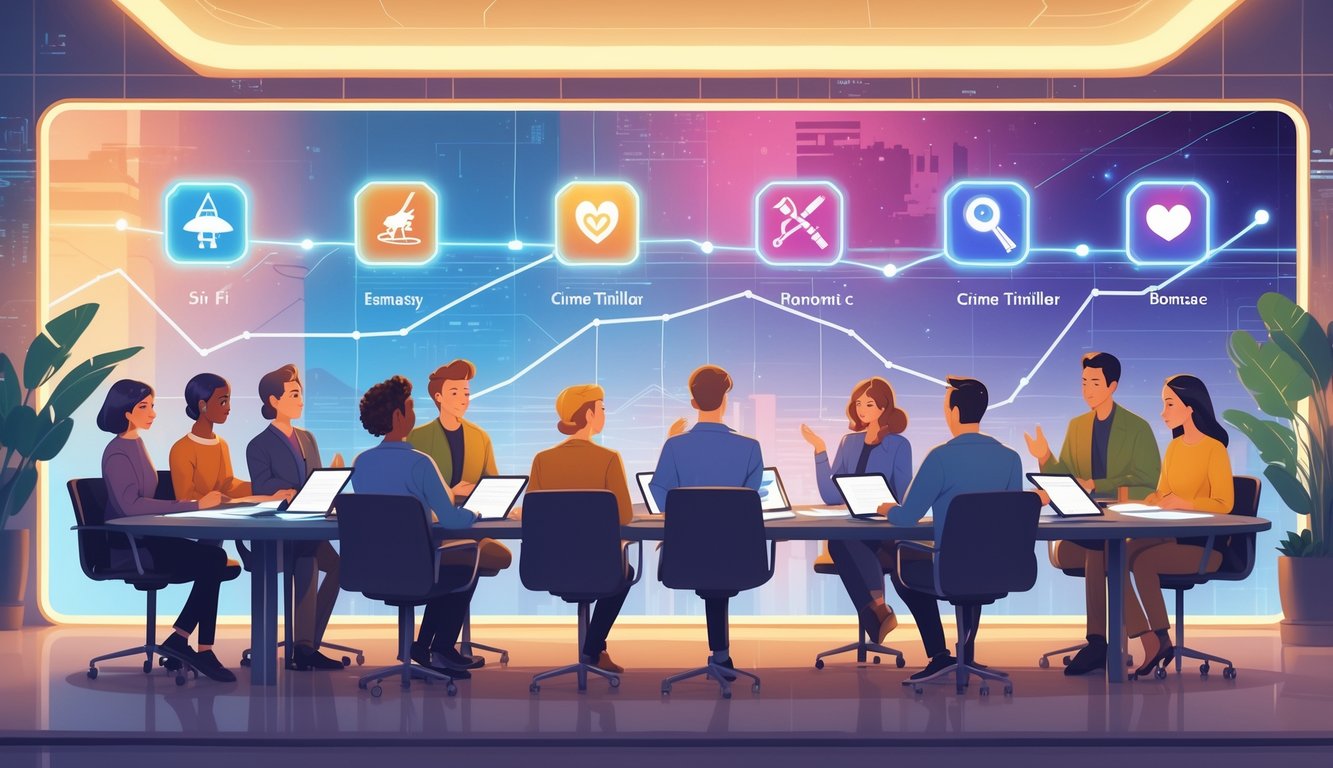
Screenwriters’ Secrets to Navigating Genre Expectations
Honestly, it drives me nuts that people treat genre like a checklist. Plug in a villain, add a twist, done. Real writers are just juggling weird tropes, dodging clichés, trying to find something fresh in a pile of half-dead formulas, and hoping to finish before lunch. It’s not some mystical instinct. There’s actual logic buried in the chaos.
Balancing Tropes and Originality
Every pitch meeting, someone’s going to mention Die Hard. It’s like a law. Tropes in screenwriting? Way heavier than outsiders realize. You can’t just ignore them. It’s like hiding veggies in pizza—audiences know, but if the cheese is good (plot hooks, reversals, whatever), they don’t mind.
I’ve seen new writers glue tropes together like bad LEGO sets; the pilot collapses by act two. Horror needs tension, but every genre’s got its own secret blueprint. The only non-negotiable: respect the audience’s radar for lazy shortcuts. Skew tropes sideways, mash expectations with weird specifics—a villain eating cornflakes during a hostage scene. I scribble a grid in my notebook: “expected” and “subverted,” then force myself to justify every swap.
And, uh, my gym bag’s still missing (don’t ask), but if you chase originality too hard, you’ll break the spell. That weird sense of familiarity? It’s like the smell of new socks.
Character Development Across Genres
Dragging a character through a genre’s expectations—yeah, that’s basically a recipe for chaos. Nobody’s begging for another cardboard detective who magically solves everything after a single, cryptic warning from the coroner. I keep meeting writers who chant “character arcs over plot” like it’s gospel, but then you sit through their stuff and just think, “Wait, what did this guy actually want?” I’m not convinced genre doesn’t totally warp character. Like, a mentor in a coming-of-age thing? Soft, gentle, probably bakes muffins. Same character in a thriller? Suddenly, they’re clutching a gun and speaking in riddles.
Development’s never tidy. I’ve got sticky notes everywhere with contradictions—comedy leads slip on banana peels and laugh it off, horror leads just freeze or lose it. And, honestly, I’ve lost count of how many times I’ve watched a newbie writer think giving a character a weird hobby makes them deep. Nope. That’s just surface. Screenwriters who actually get genre map character motives to what audiences expect—then they flip it. I’ve stolen mannerisms from strangers on the subway—mostly out of boredom, but hey, it works better than committee-approved quirks.
Mix genres and suddenly your character functions just multiply—like, it’s not math, it’s chaos math. Try shoving a rom-com lead into a gritty cop show. Does anyone ever really fix the mess? Not me. That’s what recurring guest stars are for, anyway.
Plot, Conflict, and Voice in Episodic Storytelling
You can just tell when a new show’s flailing around, trying to please everyone—awkward genre mashups, wild tone shifts, plots that spiral out like a dropped slinky. Works about half the time, if that. I crashed a panel once where a writer said mixing genres without a strong plot is “like letting toddlers pick the navigation app.” He was right, honestly. Picking a main genre keeps the voice from going off the rails, even if your B-plot is wandering around lost.
I survived my last job by taping up these three reminders: Conflict has to escalate or it’s just filler. Plot isn’t chess, it’s people making dumb, high-stakes choices. Voice is what people remember, not logic. Episodic TV means you’re always tossing some plot grenade into the next episode, so nothing wraps up cleanly. It’s annoying, but networks gobble up cliffhangers like snack food.
The running joke is that “tone meetings” eat up more hours than actually writing scripts. But they matter—word choice, pacing, even sentence length all clue viewers into the genre. You find the series voice and just staple every plot beat to it. I once wrote a sitcom scene like it was CSI—readers called me out by page three. Audiences are bloodhounds. They sniff out inconsistency faster than I lose my keys, which is, frankly, impressive.
The Streaming Era: Changing the Genre Landscape
Every platform’s out here yelling about “the future,” but honestly? It’s not a race, it’s just a mess. Genres vanish, new ones pop up—half TikTok meme, half 90s procedural, and somehow that gets picked up. Nobody agrees on anything. My inbox is full of execs asking if genres matter, but then they order seven more true crime docuseries. So, do they matter? I don’t know. Nobody knows.
Rise of Streaming Platforms and Services
Here’s the thing: streaming platforms couldn’t care less about genre boundaries. They just want to see the numbers move. An exec once told me, “If it keeps people binging, you could pitch ‘sad dogs with smartphones’ and we’d greenlight a trilogy.” Traditional TV execs used to panic about audience slices, but now streamers just run a dozen A/B tests and shift gears overnight. Development teams? Good luck keeping up. In 2022, apparently, 74% of U.S. viewers subscribed to more than one streaming service (Pew Research). Translation: someone’s grandma is paying for “Monsters & Midwives” twice. The whole scene’s shifting: 4K, HDR, infinite rewinds, genres sliced into the tiniest possible niches. I’ve watched pitch rooms say yes to “80s-slasher-horror meets Top Chef.” More checkboxes than creative ideas, honestly.
And content libraries? Don’t even start. One day your sci-fi show’s front and center, the next it’s “expired due to rights issues.” Gone. The algorithm’s the only boss that matters.
Netflix, HBO, and Disney: Genre Leadership
People outside the industry think Netflix is out here inventing new genres, but a lot of the time, they’re just calling up international formats or slapping a new label on old stuff. Disney? They’ll put any IP into a blender. Somewhere, a Marvel vampire-comedy is lurking in development. HBO’s obsessed with “prestige”—like it’s a secret recipe. One gritty drama, one sad documentary, then dragons everywhere. Every pitch meeting, someone says “the Succession of…” whatever. Prestige as seasoning, I guess. The deals here? They’re about retention numbers, not genre awards. Disney+ comedies climb the charts because they fit into the Disney machine, not because they’re original. Netflix flattens genres with “genre-bending” content—translation: please don’t leave. HBO still rides the credibility wave from “The Sopranos.”
Real drivers? Not creativity. Whoever turns a weird cross-genre idea into something people don’t skip wins. It’s all about algorithms and IP now, not some grand vision.
How Social Media Shapes Audience Tastes
If you think social media just hypes up shows, you’ve never had a plot twist leak on TikTok before the episode airs. My DMs fill up with spoilers and memes before I even finish a rewrite. Hashtags literally change storylines while we’re still filming. There’s this myth that audience feedback makes things fair, but really? It’s a funhouse mirror—whatever goes viral bends the whole slate. “Genre” on Instagram or X is just whatever’s trending. Cozy horror, cringe sitcoms, philosophical true crime—if it gets a hashtag, it gets a pitch meeting. That time #MedievalCoffeeShops trended? I pitched a coffee shop musical in feudal France. They wanted a latte fight scene. Not kidding.
I’ve watched meetings melt down as social data kills what execs loved last week. Audience pulse, tracked by every meme and viral theory, now drives programming more than focus groups ever could. Or, you know, whichever influencer leaks a clip before it’s ready.



